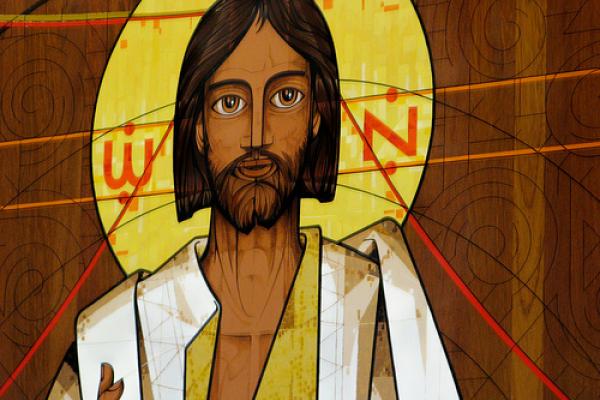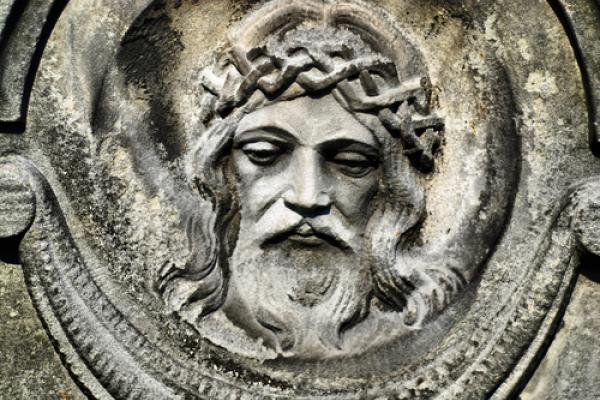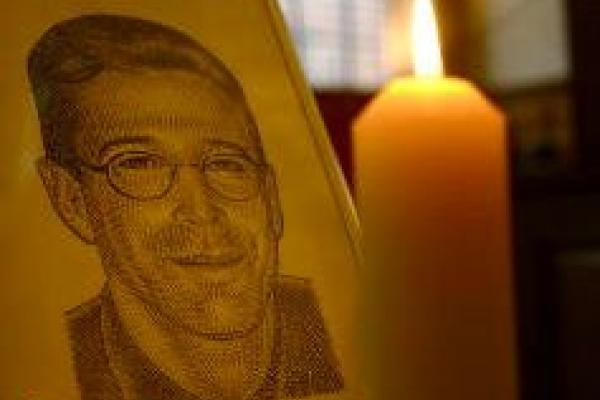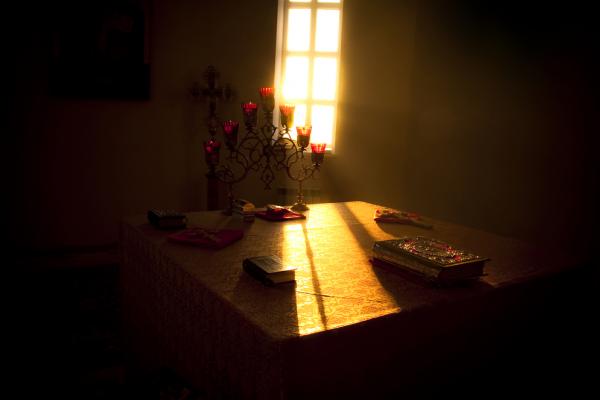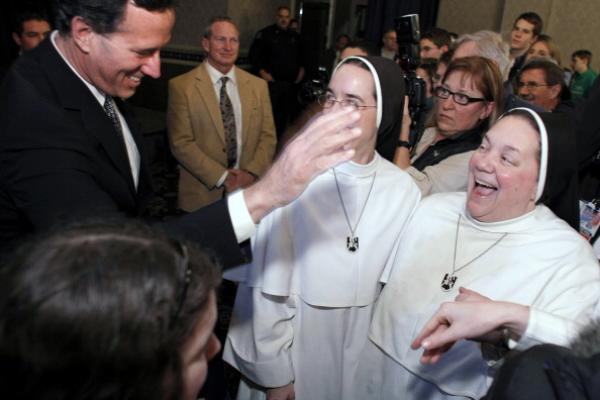O God, you are the unsearchable abyss of peace, the ineffable sea of love, and the fountain of blessings. Water us with plenteous streams from the riches of your grace; and from the most sweet springs of your kindness, make us children of quietness and heirs of peace.
From the Syrian Liturgy of St Clement of Alexandria
"But his servants approached and said to him, ‘Father, if the prophet had commanded you to do something difficult, would you not have done it? How much more, when all he said to you was, “Wash, and be clean”?’ So he went down and immersed himself seven times in the Jordan, according to the word of the man of God; his flesh was restored like the flesh of a young boy, and he was clean." - 2 Kings 5:13-14
"Dependence on God may be what is lacking in a society where consumerism and accumulation have become the root diseases of a world in which everything is not enough and nothing satisfies." - Joan Chittister from The Rule of Benedict: Insights for the Ages
Here I am, urging people to deconstruct their preconceptions about God, and this guy finds Jesus in a tortilla.
Russ, my father-in-law, lives outside of Espanola, New Mexico. He can tell you from years of living there that the area is jumping with religious mysticism. One of the most famous sites in the state is the church at Chimayo, where people visit to touch the holy dirt and be healed. There are photos of people who claim to have been restored all over the place, along with crutches and canes left behind.
I’m not one to affirm or challenge that what people experience there is real. But I did find it interesting that the priests who serve the church simply bring in new dirt to fill the hole when they get low. Perhaps they bless it; I have no idea. But it’s interesting to me the power we inhere to certain items, acts or places. Is God more or less there than somewhere else? Is there something about the experience that opens us up to the already-present God? Is it an example of the uncharted power of the human mind?
As a person who (loosely) identifies with the evangelical tradition, allow me to make a clear, unambiguous, declaration: GOD IS PRO-PEACE!
You may be thinking, “Just how exactly does a guy who claims to believe in the inspiration of Scripture arrive at the conclusion that God is pro-peace? Has this guy even read the Bible? Maybe he’s one of those amnesia-type Christians, the ones who read through the Bible every year as part of their daily devotions, and every time they get to the slavery and genocide passages, their mind goes ______________.
Maybe it wasn't those exact words, but whatever you were thinking, believe me, I get it!
There was a movement back in the 1960s that many of us only have read about, while others vividly remember. Philosophers and theologians explored what was labeled the “Death of God” movement. Interest in the subject has re-emerged particularly as of late because William Hamilton, one of the more prominent voices in the Death of God movement, diedlast week at age 87.
The movement inspired TIME Magazine’s now-famous cover (seen here) in 1966, raising the question in the public forum: Is God Dead? The cover has since been listed by the Los Angeles Times as one of the “Ten Covers that Shook the World.”
Hamilton’s faith was shaken during his teenage years when three of his friends were making a homemade pipe bomb. The project went wrong and detonated, killing two of the three boys.
The two killed were Christians. The lone survivor, an atheist.
Hamilton’s crisis of faith centered around a theological concept known as theodicy, which explores the question: why do bad things happen to good people? More specifically, why does misfortune seem to befall the faithful, while those lacking faith enjoy what seems to be a providential hall pass?
A simmering interreligious controversy resurfaced recently with the news that the Church of Jesus Christ of Latter-day Saints had posthumously ``baptized'' a number of deceased Jews, including Daniel Pearl, Anne Frank, the parents of Nazi hunter Simon Wiesenthal, and evidently an unknown number of others.
The case of Mr. Pearl is particularly revealing, and holds important questions for Americans' ongoing experiment in religious pluralism.
Pearl, while on assignment for The Wall Street Journal, was beheaded in 2002 by a radical Pakistani group connected to al-Qaida. Moments before his death, he declared: ``My father is Jewish, my mother is Jewish, I am Jewish. My family follows Judaism.''
Against a backdrop of heartland fears that U.S. Muslims seek to impose Islamic law on American courts, a leading Muslim group will launch a campaign Monday to dispel what it called misconceptions about Shariah.
The "Defending Religious Freedom: Understanding Shariah" campaign comes at a time when more than 20 states are considering or have passed laws forbidding judges from considering Shariah in their deliberations.
Many Americans associate Shariah with the harsh punishments carried out in a few Muslim countries like Afghanistan and Saudi Arabia, even as U.S. Muslim groups insist they have no desire to introduce Islamic law on themselves or others.
"There were all these wrong notions about Shariah," said professor Zahid Bukhari, president of the Islamic Circle of North America, which is sponsoring the campaign.
The most worrisome thing, he said, was that the level of hatred toward Shariah had spread from the margins of society to the mainstream. The ICNA campaign has already drawn fire from "anti-Shariah" groups in the United State
A Virginia judge has ordered seven congregations that broke from the Episcopal Church to return all property to the local diocese — from valuable land to sacred chalices — by April 30.
The Diocese of Virginia had wanted the properties returned by March 30, a week before Easter. But Fairfax County Circuit Court Judge Randy Bellows agreed to give the breakaway congregations more time.
In a closely watched case that reached the Virginia Supreme Court, Bellows ruled in January that congregations had the right to leave the Diocese of Virginia, but not to take church property with them.
Mitt Romney has trounced Rick Santorum, an ardent Catholic, among Catholic voters, but Romney's support among evangelicals has wavered thus far in the GOP presidential primary, according to a new analysis of exit poll data.
Though he won evangelicals in two states, in general Romney has performed 15 percentage points better among non-evangelicals, according to an analysis released March 2 by the Pew Forum on Religion & Public Life.
Exit poll data is available in seven of the 11 states that have held primary contests to date, according to the Pew Forum. More detailed religious affiliations are available in six of those states.
White evangelicals formed more than a third of all GOP primary voters in each state except for Nevada (24 percent) and New Hampshire (21 percent). Romney, a Mormon, won the evangelical vote in those two states, and nearly tied for first in Arizona and Florida. But he lost the evangelical vote badly in three states: Michigan, Iowa and South Carolina.
Somewhat surprisingly, Santorum has not won the Catholic vote in a single state in which data is available, according to the Pew Forum.
